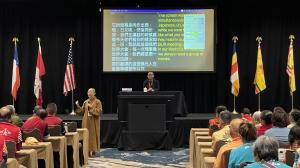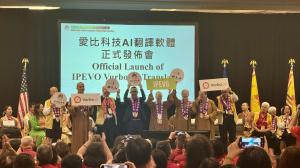
Integration of Religion and AI: Breaking Through Language Barriers to Promote the Internationalization of the Dharma
Religion Meets AI—Buddhist terminology translation system breaks language barriers in Dharma propagation.
AUSTIN, TX, UNITED STATES, April 23, 2025 /EINPresswire.com/ -- A groundbreaking advancement in the integration of religion and artificial intelligence has opened a new chapter for global Dharma propagation. With the Fo Guang Shan (FGS) Humanistic Buddhism Institute contributing a comprehensive database of 10,000 Buddhist terms, this lexicon has been seamlessly integrated into an AI-driven translation system, enabling real-time, multilingual translation of Buddhist teachings. This achievement makes the Dharma more accessible than ever, transcending borders and language barriers.This pioneering project is a collaborative effort between the Buddha's Light International Association (BLIA) World Headquarters, the FGS Humanistic Buddhism Institute, and Vurbo.ai (IPEVO). Their joint innovation, Vurbo.ai Buddhist 4.0, is the first real-time Buddhist terminology translation system and was officially launched on April 18, 2025, during the BLIA North America Fellowship Meeting.
The launch event was attended by prominent figures including BLIA World Headquarters Director Venerable Yi Kong, Secretary General Venerable Chueh Pei, Vice Secretary General Venerable Yung Ku and Venerable Hui Dong, alongside 500 BLIA North America chapter executives and representatives from Vurbo.ai. A live demonstration showcased the system’s AI capabilities and its potential impact on global religious communication.
This achievement represents more than just technological innovation—it marks a significant step in the modernization and internationalization of Humanistic Buddhism. By harnessing AI, the transmission of the Dharma can reach wider and more diverse audiences across the world.
IPEVO utilized the Buddhist terminology database as a foundation to train its large language model (LLM), enhancing its ability to accurately recognize and interpret complex religious concepts. Terms such as “Middle Way,” “the five aggregates are empty,” and “the great chiliocosm is ancient, the non-duality Dharma gate is profound” carry deep philosophical significance, and improper translation can lead to loss of meaning. To address this, the system uses an intermediary strategy—translating from Chinese to English, and then from English to other languages—to ensure semantic accuracy.
A unique feature of the system is its “one-to-many” language display capability, supporting simultaneous multilingual subtitle output. This is particularly useful for international conferences, retreats, and teachings, allowing participants to receive real-time, accurate translations in their native languages.
Development of the system spanned over six months, with continued optimization and expansion of the terminology base planned for the future. This initiative not only lays a solid foundation for the digital propagation of the Dharma but also marks a new milestone in the digitization of Buddhist education.
During the launch, Venerable Chueh Pei remarked, “Fo Guang Shan and BLIA have long been dedicated to global Dharma propagation. In the face of language and cultural challenges, this integration with AI represents a significant leap forward. Vurbo.ai is a vital milestone in the skillful use of technology to modernize religion.”
She added, “As we engage with devotees from diverse linguistic backgrounds around the world, the ability to provide simultaneous, multilingual translation enhances our efficiency and ensures clearer understanding of the Dharma.”
Alex Yang, Business Manager at IPEVO, explained, “Participants can select their preferred language by scanning a QR code, and receive simultaneous translations via subtitles or audio. This not only delivers real-time translation but also creates a collaborative bridge between religion and AI.”
The integration of AI in religious education is a clear example of the evolving role of technology in spiritual practices. With this advancement, Fo Guang Shan and BLIA continue to lead the way in promoting cultural transmission and modernizing Buddhist education, setting a powerful example for religious organizations worldwide.
WEI-JIE (George) Hu
BLIA
email us here
Distribution channels: Culture, Society & Lifestyle, Education, Religion, Technology, World & Regional
Legal Disclaimer:
EIN Presswire provides this news content "as is" without warranty of any kind. We do not accept any responsibility or liability for the accuracy, content, images, videos, licenses, completeness, legality, or reliability of the information contained in this article. If you have any complaints or copyright issues related to this article, kindly contact the author above.
Submit your press release


